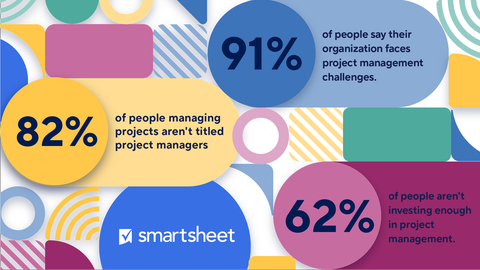Data reveals over four in five workers say projects are run by colleagues who do not have a project manager title or role, with over half of those workers being junior staff and a majority having no formal project management training
Smartsheet (NYSE:SMAR), the enterprise platform for modern work management, today released its first annual Future of Work Management Report which surveyed thousands of global employees about project and process management at their workplaces. The results show that 96% of respondents manage projects regardless of their role or formal project management training indicating a global resource recession where traditional roles are no longer what drive work. The survey revealed an opportunity for leaders to move from a resource recession to a resource revolution by focusing on their people and implementing the right technology.
This press release features multimedia. View the full release here: https://www.businesswire.com/news/home/20230124005141/en/

Smartsheet’s inaugural Future of Work Management Report reveals new insights about global resource recession. (Graphic: Business Wire)
In a slowly reopening world under macroeconomic pressure, Smartsheet’s survey shows that many organizations—regardless of industry or geographic location—are functioning with limited personnel, technology and support, requiring employees to take on additional work without proper training or experience. Nearly one-fourth (24%) of respondents manage projects despite the function not being within the scope of their job title or description. These “citizen project managers” tend to skew more junior than their titled counterparts, with 50% of citizen project managers being frontline, support or admin staff. Alternatively, over half of titled project managers are mid to upper-level management (60%).
“We are in a global resource recession, but the good news is that we have the tools to shift it into a resource revolution,” said Praerit Garg, CPO and EVP of Engineering, Smartsheet. “The constraints that organizations face aren’t going away, but leaders have a unique opportunity to innovate to meet their teams where they are. Businesses need to empower and support their people by investing in training, mentorship and software that will help scale work and retain talent.”
In order to shift from a resource recession to a resource revolution, the report found three key takeaways:
-
Support is sacred, and teams need more of it
Although the people doing the work recognize—and actively push for—support, the report found that company leaders are far more likely than others in their organizations to say that they are already investing in the tools and processes needed to solve project complications (60%). Leaders are also far less likely to admit that project teams are understaffed (20% versus 42% of non-C-level employees saying that their teams are understaffed). With so many doing project-based work today, there’s a greater need for foundational project support, with regards to both resources and tools, and senior leaders must recognize that, too.
-
The “middle work” is most critical to a project’s success and to avoiding employee burnout
The middle work, or the tasks and processes that make up a project, is where the project moves forward, but it can also be where it breaks down. Nearly three-quarters of employees expect their company to ask project teams to accomplish even more with less in the near future (72%), and half of project professionals expect deadlines to stay the same moving forward (51%). This shows that things aren’t slowing down, regardless of whether teams have the resources or tools to be successful. In order to overcome these challenges, teams need to focus less on deadlines and more on the middle work that will take the project from start to finish. Report data shows that irrespective of deadlines, there is a clear connection between effectively managed projects and job satisfaction, with over half (54%) of employees reporting that when projects run smoothly stress is lower and satisfaction is higher (56%).
-
Repeated work is wasted work
Projects are only as good as the processes they’re built on. Since the middle work is so critical, the best way to ensure the success of projects is to take learnings and turn those lessons into scalable, repeatable processes. The report showed that when projects have an experienced project manager, respondents felt that work quality was higher (57%), more efficient (49%), within budget (42%) and that there was greater collaboration between teams (40%).
“With deadlines becoming tighter, expectations higher, and resources becoming more constrained, we’re going to continue to see more project-based work,” said Ben Canning, SVP of Product, Smartsheet. “Employees are being left to fill in gaps without proper training or experience. For organizations to fully embrace the resource revolution they need to focus less on individual projects and more on implementing scalable and repeatable processes to set their teams up for success over the long run.”
To read the full Future of Work Management 2023 report and insights for you and your company, click here.
About Smartsheet
Smartsheet (NYSE: SMAR) is the enterprise platform for modern work management. By aligning people and technology so organizations can move faster and drive innovation, Smartsheet enables its millions of users to achieve more. Visit www.smartsheet.com to learn more.
Report Methodology
The Smartsheet Future of Work Management Report survey was conducted in September 2022 by Wakefield Research among 8,000 employed adults aged 18-74, who work at companies with a minimum of 50 employees, evenly distributed among the following markets: United States, UK, Australia, and DACH (Germany, Austria, Switzerland). All respondents self-reported that they engage, in some capacity, in project-based work, as defined as “projects that have a beginning and an end.” These project professionals—who represent about 60% of the adult employed audience who work in companies with 50+ employees—span a wide range of industries from IT and business services, to healthcare and pharma, to banking and finance, and construction and manufacturing and a wide range of titles and levels within their organizations.
View source version on businesswire.com: https://www.businesswire.com/news/home/20230124005141/en/
Contacts
Chrissy Vaughn
pr@smartsheet.com
